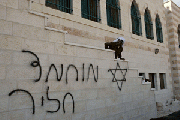JERUSALEM — Days after his half-hearted conciliatory UN appearance, Israeli Prime Minister Benjamin Netanyahu has already approved the construction of 1,100 flats in occupied East Jerusalem. Yet on Sunday, he threw his support behind the new Mideast Quartet’s peace plan with the Palestinians.

|
| A Palestinian looks at Hebrew writing on the wall of a mosque in the West Bank village of Qusra, near Nablus in this September 5, 2011 file photo. They strike in the dead of night, setting fire to mosques and daubing their walls with “Price Tag” graffiti, the defiant slogan of Israeli settlers waging a vigilante campaign branded as “un-Jewish” by President Shimon Peres. Picture taken September 5, 2011. REUTERS/Abed Omar Qusini |
“Israel is welcoming the Quartet’s call for direct negotiations without pre-conditions between Israel and the Palestinian Authority,” the Prime Minister’s office said in a statement. The favorable response came at the end of two meetings of the most influential cabinet ministers of the far-right coalition under Netanyahu.
“Israel calls on the PA (Palestinian Authority) to follow suit and to immediately join direct negotiations,” the statement added.
A fortnight ago, in a last-ditch effort to try to harmonize the Palestinian unilateral statehood bid at the world’s body with bilateral peace talks, the Mideast Quartet for Peace (U.N., U.S., EU and Russia) issued a new peace initiative for Israel and the PA.
The new plan calls for the parties to resume direct peace talks within a month, to present their proposals for permanent borders and security arrangements within three months, and to reach a final agreement within a timeframe “not longer than the end of 2012.”
Yet the approval of the new construction scheme in the Jewish Gilo neighborhood-settlement creates doubts about the stated willingness of the Israeli government to start serious talks with the Palestinians.
From an outsider’s view, Netanyahu seems to have, once again, overplayed his settlement hand. Though the Quartet statement doesn’t mention a freeze in settlement building as pre-condition for talks, it demands that the parties pledge to refrain from “provocative actions.”
The latest settlement building approval brings to mind a similar decision. In March 2010, the construction of 1,400 apartments in another East Jerusalem neighborhood-settlement was adopted during a visit to Israel by U.S. Vice-President Joe Biden, considered a supporter of Israel. The embarrassing situation led to a much-publicized crisis of confidence between President Barack Obama and the Israeli leader.
This time too, Netanyahu was personally reprimanded – by Chancellor Angela Merkel, Israel’s staunchest ally in Europe, who let it be known to the German media on Friday that she was “furious” with Netanyahu and that she “doesn’t believe a word [he] says.”
She told Netanyahu, “I cannot understand how just a few days after the Quartet statement, you approve 1,100 new housing units,” the liberal daily Haaretz quoted German media reports as saying.
Settlers’ mosque-burning campaign expands into Israel
Meanwhile, settlers are setting fire to mosques and daubing their walls with “Price Tag” graffiti, the defiant slogan of Israeli settlers waging a vigilante campaign against Palestinians, a campaign branded as “un-Jewish” by President Shimon Peres.
The “price-taggers” have vowed to avenge any move by Israeli authorities to uproot settlement outposts built in the occupied West Bank.
Dozens of those outposts, which Israel has repeatedly promised its main ally, the United States, to remove, remain on lonely West Bank hilltops on land to which many settlers claim a Biblical right and where Palestinians want to build a state.
On some of the few occasions when Israeli army bulldozers have torn down structures at the outposts, Palestinian villagers have awakened the next morning to find a local mosque charred by fire and with the now-familiar graffiti on its walls.
Israeli leaders have condemned the incidents. But no one has been charged in the three arson attacks in the West Bank over the past year, an indication, Palestinians say, of indifference by a right-wing government that includes pro-settler parties.
Now the “Price Tag” campaign has widened to include vandalism at an Israeli army base in the West Bank and the torching of two mosques, one this week in a Bedouin village inside Israel, touching a nerve among the country’s leaders and the public.
At stake is the delicate fabric of co-existence between Israel’s Jewish majority and its Arab minority, which makes up some 20 percent of the population.
“Israel had better know that it will pay for this,” said a resident of Tuba-Zangariya in the Galilee, where a mosque was burned on Monday, prompting dozens of Israeli Arabs to take to the streets and hurl rocks at police, who responded with tear gas.
Graffiti left at al-Nur mosque suggested the “price-taggers” were responding to the deaths of a settler father and baby killed last month when their car overturned in the West Bank after Palestinians threw rocks at it.
Police said they had set up a special task force to deal with the “price taggers” and announced on Thursday that they had arrested a suspect in the Tuba-Zangariya case.
In another potential breakthrough against the militants, three settlers were charged in a court in Jerusalem on Wednesday with planning to set fire to a West Bank mosque.
In addition to assaults on mosques, militant settlers have been blamed for a string of car burnings and the uprooting of hundreds of olive trees and grapevines on Palestinian property.
The “Price Tag” campaign is widely believed to be the work of a clandestine group of young settlers in unauthorized outposts where journalists are not welcome.
Security officials say such close-knit groups are tough to infiltrate, making it difficult to prevent mosque attacks or find out who carried them out.
But Avraham Dichter, a former chief of Israel’s internal security agency, the Shin Bet, told Reuters the time had come to move against militant settlers, whom he described as “miserable people with a terrorist mindset.”
— Combined reports






Leave a Reply